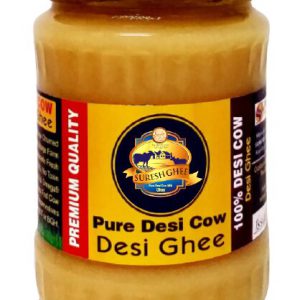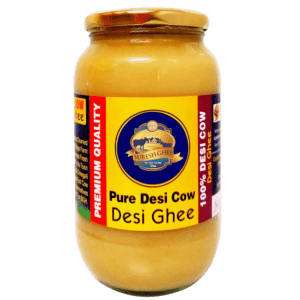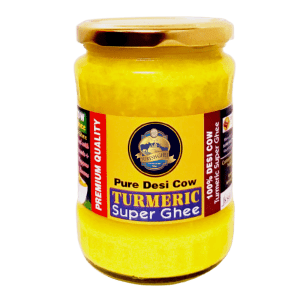People with diabetes have to be vigilant of their dietary preferences, considering their diet may hit the blood sugar levels. Diabetes may not be cured fully; however, preparing for an appropriate meal plan and engaging in physical activity is crucial to managing diabetes in a better way.
Apart from this, there are many foods that may be considered healthy when it comes to managing and maintaining blood sugar levels. The debate over ghee or clarified butter doesn’t seem to end. While many proponents claim that desi ghee is great for diabetics, some consider it unsuitable for them.
Desi Cow Ghee has been considered the healthier alternative to most cooking oils that may be harmful to diabetics; however, the amount of fat it contains has raised quite some eyebrows in recent times.
Hormones! They play a vital role in the functioning of the body. Hormones are the chemical messengers which command certain cells or tissues to act in a particular way that supports a certain function in the body.
What is insulin?
Insulin is produced in the islets of Langerhans( present in the pancreas), which produces the hormones beta cells. The beta cells further produces insulin. Let me tell you in simple words regarding the role of insulin. Insulin is an essential hormone which keeps the individual alive.
What is insulin resistance?
Insulin resistance is a pathological condition in which the cells do not respond normally to insulin.
Understanding the role of insulin
When an individual is suffering from insulin resistance there is an increase in risk of prediabetes, type 2 diabetes and metabolic syndrome.
- Prediabetes
When the pancreas does not produce enough insulin the blood sugar level can become mildly raised and can further cause prediabetes.
- Type 2 diabetes
An individual suffering from type 2 diabetes produces more insulin. The body overproduces insulin to maintain normal blood glucose levels. After a certain time period, the overproduction leads to burning out of the insulin producing cells. The patient can manage blood glucose levels as the body produces insulin, but certain changes with lifestyle, diet and medication can control the blood sugar levels of the patients.
- Metabolic syndrome
It is a collection of metabolic risk factors which make a way for type 2 diabetes and heart diseases as well.
Precautions for taking ghee for insulin resistance
Though desi ghee is safe for diabetic patients in different ways and it is recommended by keeping a few things in mind.
- Ghee can have immense effects on body weight. If we are unable to control the fat over time then it will lead to higher weight. This fact must be taken care of by diabetics as they need extra care of the management of weight and keeping body weight in control.
- If you want to buy ghee in the market then always buy desi ghee as they have immense benefits to consume and less harmful facts. The vital importance has been found in ghee because of its manufacturing process of making from the milk of grass-fed cows.
- Aside from buying the ghee from stores you have to prefer the ghee from organic firms. It is a better and lots healthier option to avoid the consumption of adulterated ghee.
- When we are talking about the daily consumption of ghee in your diet, make a decision by considering your regular sugar levels and it’s post effects. In moderate proportion, ghee is the best insulin resistance medium.
- Ghee is also promoted the better secretion of insulin in the body as it is a required hormone for diabetic- maintenance, is also essential with the inclusion of desi ghee in diet. GLP-1, gut hormone and provides the active and efficient functionality to stimulate the insulin.

Buy cow Ghee Online : Order Now. Free Shipping
Symptoms of insulin resistance
You will observe the symptoms only when you develop type 2 diabetes or prediabetes. The common symptoms are –
- Increased thirst and hunger
- Fatigue
- Frequent urination
- Blurred vision
- Darkened skin on certain parts of the body, such as neck, elbows and knees etc. (type 2 diabetes)
Prevention of insulin resistance
- Lose weight
- Exercise regularly
- Get plenty of sleep
- Quit smoking
- Manage your stress levels
Diet plan to improve insulin resistance
| Diet to improve insulin resistance | Diet to avoid for insulin resistance |
| Foods rich in Omega 3 fatty acids such as desi ghee and salmon. | Beverages which taste sweet. |
| Foods with antioxidant property such as ghee, sea foods and apples | Alcohol in large quantities. |
| Non- starchy vegetables such as broccoli. | Sugary foods like sweets, chocolates and ice creams. |
| High fibre foods like whole grains. | Foods with high saturated fats like butter, chocolates. |
| Protein rich foods like nuts, fish and lean meats. | Processed foods. |
| Lots of water. | Excessive consumption of fried foods. |
| Foods with high carbohydrates content. |
Diet tips for insulin resistance
- When you avoid the intake of foods with carbohydrates, eating right amount of fat can help you go a long way to keep yourself healthy and nourished with nutrients. Do not live with the myths that fat will harm your immune system. Fat is one such important element for the body just like vitamins, minerals and proteins.
- Studies have proved that monounsaturated diet in type 2 diabetes reduces the insulin resistance. Consume the right saturated fats such as grass-fed ghee and coconut oil for insulin resistance.
- Always listen to your body by giving it proper nourishment. It basically means, eat when you are hungry and do not over eat certain foods. And also don’t have a count on calories when you are already consuming a balanced diet.
- Getting Vitamin D and calcium in your regular diet will also help you maintain your insulin levels. You might be wondering how milk can be beneficial? As dairy foods are a big “NO” when it comes to insulin resistance.
Ghee has always been a superfood that helps to absorb the nutrition from other foods as well. Drinking a warm glass of milk added with a spoon of desi cow ghee can surely be a good combination of calcium and vitamin. You can buy organic grass-fed cow ghee at our online store. Visit our website https://sureshfoods.com/ to know more.
Diet is one such important element which is responsible for the proper working of the body and maintenance of good health. It is not just because of the medical issues but a poor diet also leads to commence of various ailments.
You would have gone off ghee, once you got diabetic. Ghee is one such essential soluble fat that reduces the glycemic index of food. By consumption of foods low in the glycaemic index can help you overcome ailments caused due to insulin resistance.
Ghee is not only loaded with health benefits but also acts like a great friend to other foods, by completing them and also letting them work better for us. Ghee has various roles when it comes to curing ailments. Ghee regulates blood sugar levels which rescues you from diabetes.
Let me tell you regarding the various health benefits of desi cow ghee!
- Loaded with Vitamin A, D, E, K
- Detoxifying agent
- Omega 3 and 6 fatty acids
- Anti-inflammatory agent
- Source of energy
- Healing agent
- Lubricator
- Immunity booster
- Improves ojas status
- Beauty enhancer
- Ayurvedic medicine
Desi ghee is also used to cure various ailments like –
Constipation
Desi cow ghee is rich in butyric acid; a short chain fatty acid which nourishes the cells of the intestine by which the gut lining gets healed. Thus, digestion becomes easy and constipation issues can be reduced.
Dry throat and dry cough
Desi cow ghee has an anti-inflammatory property which makes helps to cure irritation and the lubricating property provides relief.
Clogged nose
Desi cow ghee is used to cure clogged nose by Nasya treatment as the ghee travels to the throat and gives a soothing effect.
As ghee is rich in Omega 3 fatty acids and Vitamin D; adding of omega 3 fatty acid to antitumor medications can result in disease stabilization. It is also rich in Conjugated Linoleic Acid (CLA) which protects us against carcinogens.
Cardiovascular disease
As mentioned above the CLA present in ghee protects us from cardiovascular problems. But always remember too much consumption of ghee cannot help you cure heart ailments.
Sinus problem
Sinus problem occurs when the nasal cavities are infected. Thus, when 2-3 drops of ghee is added in the nostrils it helps to cure sinus.
Normal vision problems
Ghee is loaded with essential fat soluble vitamins like Vitamin A, D, E, K and Omega 3 fatty acids which helps to improve vision problems.
Ghee is said to promote ojas status by ensuring positive mind and good mental health.
Read our blog – Ghee- A short consideration from Ayurvedic perspective
You would have almost restricted many food items once you are declared diabetic due to insulin resistance. Consumption of a particular amount of ghee every day in your diet will surely help you have a healthy life. You may have the urge to have various delicious food items, but you tend to force yourself to avoid them due to diabetes. Always remember that too much consumption of ghee will not help you relish any of the above mentioned benefits. You can buy organic grass-fed cow ghee at our online store. Visit our website https://sureshfoods.com/ to know more.
How much Cow Ghee can a Diabetics Consume ?
When it comes down to intake of cow ghee for diabetics, minimal amount of consumption is important to shield any adverse effects. Here are some beneficial considerations:
1. Choose High-Quality Cow Ghee:
Go for good quality cow ghee to assure that you are harvesting the complete benefits without any additives or impurities.
2. Moderate Consumption:
People having diabetes should set their routine consumption of cow ghee to 1-2 teaspoons. Increased amount of consumption can be harmful to health.
3. Seek Professional Guidance:
A prompt consultation with a certified nutritionist to maintain a well-balanced meal plan that implements an optimal quantity of cow ghee. Such assures that the complete diet is necessary for managing diabetes.
It is pivotal to encourage moderation when implementing ghee into the diet. Set the limit for the daily intake to 1-2 teaspoons and ensure adding it to rice, dal, or khichdi for a balanced meal of the day.
Is Ghee Beneficial for Diabetics?
Health experts and nutritionists have determined the pure desi cow ghee as an important addition to the meal for people with diabetes. Pure cow ghee is renowned for its curative and therapeutic attributes, determining multiple benefits for diabetic individuals:
- Curative Properties:
Pure cow ghee is recognised to possess curative attributes that can positively affect the well-being of diabetics.
- Therapeutic Benefits:
The therapeutic advantages of cow ghee may support in managing diabetes efficiently.
- Nutritional Advantages:
Cow ghee delivers a nutritional benefit, creating it a favorable option for diabetics when consumed in moderation.
Implementing pure cow ghee into a diabetic-friendly diet, with the help of a professional guidance, can deliver such advantages without compromising health.







 WhatsApp us
WhatsApp us
Naveen m...